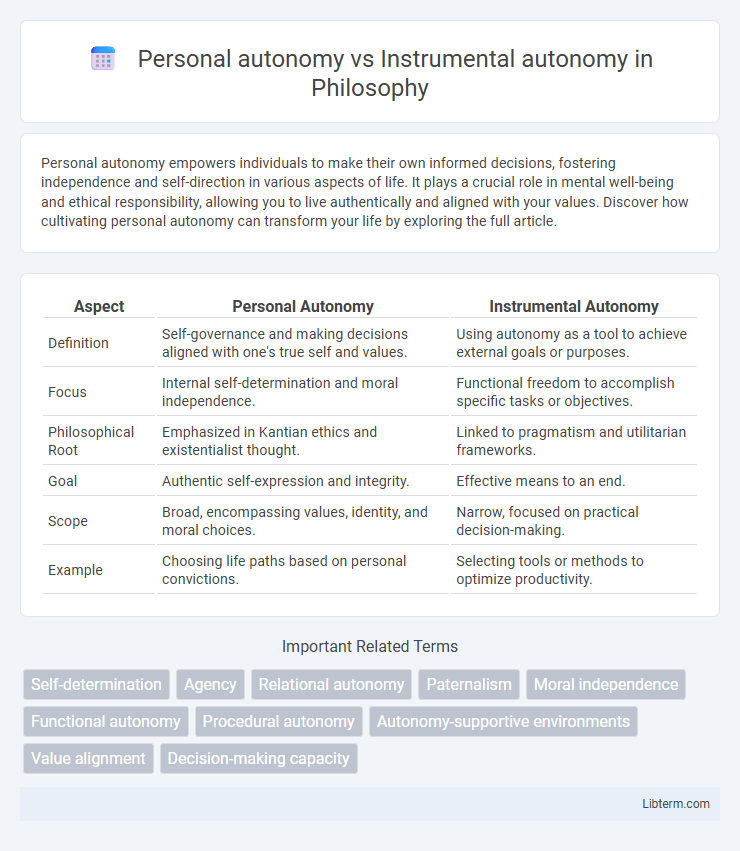Personal autonomy empowers individuals to make their own informed decisions, fostering independence and self-direction in various aspects of life. It plays a crucial role in mental well-being and ethical responsibility, allowing you to live authentically and aligned with your values. Discover how cultivating personal autonomy can transform your life by exploring the full article.
Table of Comparison
| Aspect | Personal Autonomy | Instrumental Autonomy |
|---|---|---|
| Definition | Self-governance and making decisions aligned with one's true self and values. | Using autonomy as a tool to achieve external goals or purposes. |
| Focus | Internal self-determination and moral independence. | Functional freedom to accomplish specific tasks or objectives. |
| Philosophical Root | Emphasized in Kantian ethics and existentialist thought. | Linked to pragmatism and utilitarian frameworks. |
| Goal | Authentic self-expression and integrity. | Effective means to an end. |
| Scope | Broad, encompassing values, identity, and moral choices. | Narrow, focused on practical decision-making. |
| Example | Choosing life paths based on personal convictions. | Selecting tools or methods to optimize productivity. |
Understanding Personal Autonomy
Personal autonomy refers to an individual's capacity for self-governance, encompassing the ability to make informed, authentic decisions that reflect personal values and desires. It emphasizes internal coherence and self-determination, where choices are driven by one's own reasoning rather than external forces. Understanding personal autonomy involves recognizing the role of critical self-reflection and emotional awareness in exercising freedom responsibly and meaningfully.
Defining Instrumental Autonomy
Instrumental autonomy refers to the capacity to use tools, resources, or external aids to achieve specific goals effectively, emphasizing practical functionality over intrinsic self-governance. It involves applying learned skills or techniques to manipulate environments or systems for desired outcomes, highlighting utilitarian aspects of autonomy. This concept contrasts with personal autonomy, which centers on self-determination and internal decision-making processes independent of external instruments.
Key Differences Between Personal and Instrumental Autonomy
Personal autonomy refers to the capacity of individuals to make independent decisions based on their values, beliefs, and preferences without external influence; instrumental autonomy emphasizes the ability to use skills and tools effectively to achieve specific goals. Key differences include the focus on self-governance and moral agency in personal autonomy versus task-oriented efficiency and functional competence in instrumental autonomy. Personal autonomy involves autonomous decision-making and identity expression, whereas instrumental autonomy pertains to practical problem-solving and control over external resources.
Philosophical Foundations of Autonomy
Personal autonomy emphasizes an individual's capacity for self-governance based on authentic desires and values rooted in moral philosophy. Instrumental autonomy, conversely, views autonomy as a means to achieve external goals or social functions, often aligned with utilitarian frameworks. Philosophical foundations highlight the tension between autonomy as intrinsic self-constitution versus autonomy as a tool for practical outcomes.
Personal Autonomy in Everyday Life
Personal autonomy in everyday life refers to the capacity of individuals to make informed, uncoerced decisions that reflect their values, preferences, and beliefs. It emphasizes self-governance and the ability to act independently within personal and social contexts, fostering psychological well-being and a sense of agency. This form of autonomy contrasts with instrumental autonomy, which centers on using tools or methods to achieve specific goals rather than prioritizing inner self-determination.
Instrumental Autonomy in Decision-Making
Instrumental autonomy in decision-making refers to the ability to use tools, strategies, and cognitive processes effectively to achieve specific goals, emphasizing practical competence over personal values or desires. This form of autonomy focuses on the efficiency and rationality of choices, often linked to problem-solving skills, self-regulation, and goal-directed behavior. In contrast to personal autonomy, instrumental autonomy prioritizes the functional aspects of decision-making, ensuring actions align with external objectives and situational demands.
The Role of Consent and Choice
Personal autonomy emphasizes an individual's capacity to make informed, uncoerced decisions about their own life, highlighting the importance of genuine consent and authentic choice. Instrumental autonomy views autonomy as a tool to achieve specific goals, where consent and choice are evaluated primarily for their effectiveness in facilitating outcomes. Understanding the role of consent and choice in these frameworks clarifies the ethical boundaries between respecting personal freedom and utilizing autonomy as a means to an end.
Autonomy in Medical Ethics
Personal autonomy in medical ethics emphasizes patients' right to make informed decisions about their own healthcare based on individual values and beliefs. Instrumental autonomy refers to respecting autonomy as a means to achieve better health outcomes and adherence to treatment plans. Balancing these perspectives ensures ethical medical practice that honors patient dignity while promoting effective clinical care.
Societal Implications of Autonomy Types
Personal autonomy emphasizes individual self-governance and decision-making freedom, fostering creativity and responsibility but potentially challenging collective norms. Instrumental autonomy centers on using autonomy as a tool to achieve specific societal goals, enhancing cooperation and social order while possibly limiting personal freedoms. The balance between these autonomy types influences social cohesion, policy development, and the protection of human rights within diverse communities.
Balancing Personal and Instrumental Autonomy
Balancing personal autonomy, which emphasizes self-governance and individual decision-making, with instrumental autonomy, centered on achieving specific goals through external tools and systems, is essential for effective empowerment. Navigating this balance requires recognizing the importance of maintaining personal values and freedom while leveraging external resources to enhance productivity and goal attainment. Optimal autonomy integration supports adaptive decision-making that respects personal integrity and maximizes functional outcomes.
Personal autonomy Infographic

 libterm.com
libterm.com